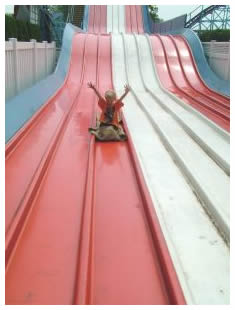 We are not born with high self-esteem. Or low self-esteem for that matter. Self esteem in either form is bestowed upon us by our primary caregivers, usually our parents. It is modified over time by our peer group, and significant others. Whatever the nature of the self-esteem we currently possess, the attaining of it is not quite as simple as our parents saying positive or negative things about us.
We are not born with high self-esteem. Or low self-esteem for that matter. Self esteem in either form is bestowed upon us by our primary caregivers, usually our parents. It is modified over time by our peer group, and significant others. Whatever the nature of the self-esteem we currently possess, the attaining of it is not quite as simple as our parents saying positive or negative things about us.
The development of self-esteem depends on a number of factors, some of which are dependent upon the nature of the infant itself right from the first days of life. Research has proven what countless parents have known for generations—that children are not blank slates, and arrive in the world with a “difficult”, “slow-to-warm”, or “easy” temperament. This early predictor of temperament gives a good yardstick in determining the character of the adult. This means adults as well as children will have easy or difficult temperaments. Society accepts the former quite readily, but is sometimes reluctant to accept that babies are not born alike.
Temperament type is just one factor in how the intricate relationship between parent and child will develop. A match between an “easy” child and a “patient” parent makes for a parent-child relationship made in heaven. An “easy” child is obviously the easiest option for both the “patient” and the “not-so-patient” parent to deal with. A “difficult” child will be a challenge for a patient parent, who will probably eventually achieve what is called a “good-enough” relationship with their child. “Good-enough” simply means that the parent has supplied enough physical, mental, and emotional support to the infant to ensure that they have been given the basic building blocks to survive and thrive in the outside world. On the other hand, a “difficult” child coupled with a “non-patient” parent can often lead to less than “good-enough” results, with any number of behavioral problems set in place, including those related to self esteem.
There is not intended for any blame to be attached to the terms “difficult” as applied to the child, or “non-patient” to the parent. The child may be “difficult” for a number of reasons—neonatal illness, introverted temperament, inadequate sleep, and feeding patterns. Similarly, the parent may be “non-patient” due to illness, profound lack of sleep, pre-existing health, financial or personal problems, or emotional problems. There are, unfortunately, a percentage of parents who, being immature and unready for parenthood, will neglect or abuse their children, either physically or emotionally.
The good news is that, however long we have suffered from low self-esteem, there is something we can do about it. We will deal with the first thing we need to change—ourselves—in coming articles.
Contact Beth McHugh for further information or assistance regarding this issue.

